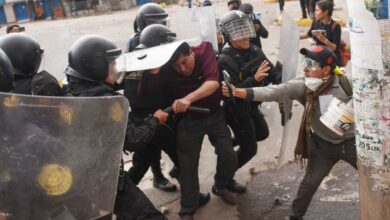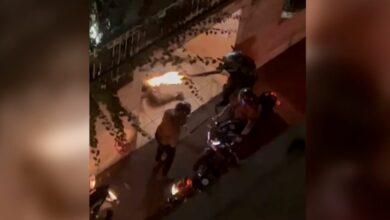Maha Ibrahim didn’t care who heard her and didn’t care if her name was published.
“We’re all afraid for our children. And we should be afraid because they are in danger,” shouted the young Alexandria homemaker who wears the niqab (full face veil). “We’re afraid of our own government.”
Friday’s protest in Alexandria was hardly the first demonstration in Egypt against police brutality and the emergency laws. But it was clear that the case of Khaled Saeed–the young Alexandria man beaten to death in public by police according to multiple witnesses–has unleashed forces and tensions that take Egypt into uncharted territory.
For starters, there was the sheer size of the protest–at least 3,000 people according to organizers. Beyond that, what was striking was the raw anger on display and the number of ordinary, normally apolitical citizens who turned out to protest what they claim is a systemic culture of violence and brutality among Egypt’s police and security forces.
“It’s not just Khaled Saeed,” said one Alexandrian law student who declined to give his name. “There was hundreds of cases like this. It happens every day here.”
The case has become a powerful rallying point for activists and ordinary citizens calling for an end to the “emergency laws”–the state of defacto martial law that has governed Egypt for President Hosni Mubarak’s entire 29-year reign.
Saeed has come to be known as the “emergency law martyr” and protestors on Friday called for the repeal of the law, the resignation of Interior Minister Habib el-Adly and the prosecution of the officers involved.
“All we want is for the police to be held accountable before the law,” said Hamdeen Sabahy, a veteran activist and independent MP, who attended the protest.
Sabahy attended the protest along with Mohammed ElBaradei, whose grassroots domestic reform campaign includes the repeal of the emergency laws among its demands. ElBaradei paid his condolences to Saeed’s family earlier in the day, but stayed only briefly at the protest following Friday prayers at the Sidi Gaber mosque and didn’t address the crowd.
The details of the case are now familiar to most followers of the Egyptian political scene. On June 6, Saeed, 28, was violently dragged out of an Alexandria internet café by two plainclothed police officers, according to multiple witnesses. Several customers and the internet café’s owner have given interviews saying they saw the two officers brutally beat Saeed in an alleyway. He was pronounced dead on the scene.
The incident prompted protests throughout the country after pictures of Saeed’s battered face and broken teeth circulated widely on the internet. Those protests only intensified when the coroner’s report backed the police claims that Saeed choked to death when he tried to swallow a packet of marijuana as the officers approached him.
In response to the growing controversy, prosecutors ordered Saeed’s body to be exhumed for a second autopsy. But the second coroner’s report–released on Wednesday–backed the original finding and speculated that Saeed’s injuries resulted from his resisting arrest.
The case continues to draw international attention. The US State Department has called for a transparent investigation of Saeed’s death, and Human Rights Watch issued a statement challenging the official version of events.
“Witness accounts and the photographs of Khaled Saeed’s mangled face constitute strong evidence that plainclothes security officers beat him in a vicious and public manner,” said Joe Stork, HRW’s deputy Middle East and North Africa director.
So far, the Egyptian government and Interior Ministry has remained defiant. Friday’s protest took place amid a massive deployment of black-clothed riot police who kept the protestors penned into a one-block area. Other protests have been violently suppressed and broken up by security forces.
Anonymous security sources have been widely quoted in local newspapers, saying Saeed was a habitual drug user with a long criminal record. Friday’s issue of the independent daily Al-Dostour quoted one such unnamed security official as saying that the case had been blown out of proportion and was being exploited and exaggerated by “shadowy foreign organizations.”
Those claims hold little credibility for the citizens who showed up at Friday’s protest.
“Even if he was a drug addict, even if he killed 30 people, that’s a job for a court and a judge,” said Ibrahim, the young mother.
Egypt




